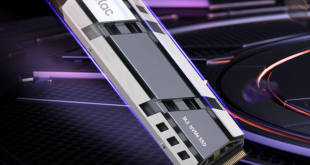We received a new bios just before testing which is a pleasant change, as we normally receive one after most of the testing is done!
The Gigabyte F2A85X-UP4 presents the user with a graphical interface, which can be disabled in favour of the more advanced options. For a beginner however, the ‘3D BIOS' may be enough for modest changes. For the remainder of this page however we have it disabled.
An overview of the system, before we attempt to try any overclocking. First we want a look at the rest of the interface.
The board running the latest F3C bios. Updating the bios is straightforward and can be accessed directly in the bios, without the need for a complex procedure.
The Bios Features panel is used to disable and enable startup settings, as well as for changing the peripheral boot position.
The power management menu is self explanatory.
The ‘Save & Exit' menu allows the end user to adjust the boot priority and to save and load profile settings.
A bios overview of the A10 5800K processor. We can see the the clock speed is set to 3.8ghz, with a boost up to 4.2ghz.
Gigabyte bioses are comprehensive, but we dislike how they split various advanced sections into multiple panels. ASUS place all the overclocking options into a single main panel. Overclocking the A10 5800k on the Gigabyte F2A85X-UP4 requires navigating three or four different panels. The sooner they unify all these into a single page, the better.
In this review we are using Corsair Dominator Platinum 2,666mhz, however the motherboard was only able to detect a profile of 2,133mhz as shown above. You can read the standalone review of this memory running on a Z77 motherboard, over here.
The auto voltage on this board is set to 1.475. We spoke with AMD's Sami Makinen to discuss ‘safe' voltages and he said that any higher than 1.475v was ‘risky'. In order to ensure we could complete the review today (and not kill the processor) we didn't push past his recommendations for any length of time.
We are using the entry level Antec 620 liquid cooler today, which is quiet and very capable. Temperatures were listed as 37c idle.
Pushing to 4.6ghz was easy enough so we tried 4.8ghz at 1.475 volts. Stability at 4.8ghz or 4.7ghz wasn't 100% prime stable at this speed, but we found if we increased the core voltage to 1.52 volts that it was. We didn't want to potentially damage the processor however long term under Sami's recommendation, and backed down to 4.6ghz at 1.475v. Still a decent overclock.
CPU validation is available at this speed, over here.
 KitGuru KitGuru.net – Tech News | Hardware News | Hardware Reviews | IOS | Mobile | Gaming | Graphics Cards
KitGuru KitGuru.net – Tech News | Hardware News | Hardware Reviews | IOS | Mobile | Gaming | Graphics Cards

















The prices of these A85X motherboards are stupid. I wouldnt pay this for a board for a £95 chip
Nice one AMD, im impressed with this chip. might think about getting one later this year, but I agree on motherboard price. it makes the whole deal seem less palatable.
Awesome stuff, love it.
Does kind of make me wonder when using a discrete graphics, that unless the on-board graphics hybrid crossfires with it, what’s the point of having have half the die of the chip made up of graphics. Being a gamer i wouldn’t be using the on-board, I know that it is a nice balance, but id love to see an AMD Piledriver sans graphics (Binary ?) with the full die for the CPU. Selfish maybe… 😉